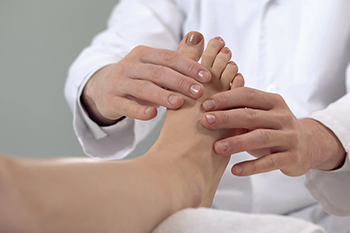

Bunions are a common affliction of the foot where a bony bump develops on the side of the big toe. This causes the top of the big toe to point towards the second toe, and the structure of the big toe’s bones can be manipulated. A medical professional, such as a podiatrist (a foot specialist), may recommend to you several different treatment options for your bunions short of a surgical procedure. For instance, it might be recommended to take nonsteroidal anti-inflammatory medications to minimize inflammation. Also, a podiatrist might recommend avoiding physical activities that exacerbate symptoms of bunions or wearing footwear that provides more space in the toe box area. Lastly, a podiatrist may recommend applying an ice pack to your bunions several times a day to reduce inflammation. Contact a podiatrist today if you have a case of bunions.
If you are suffering from bunions, contact Dr. Harris L. Klear of Burlington County Podiatry Associates. Our doctor can provide the care you need to keep you pain-free and on your feet.
What Is a Bunion?
A bunion is formed of swollen tissue or an enlargement of boney growth, usually located at the base joint of the toe that connects to the foot. The swelling occurs due to the bones in the big toe shifting inward, which impacts the other toes of the foot. This causes the area around the base of the big toe to become inflamed and painful.
Why Do Bunions Form?
Genetics – Susceptibility to bunions are often hereditary
Stress on the feet – Poorly fitted and uncomfortable footwear that places stress on feet, such as heels, can worsen existing bunions
How Are Bunions Diagnosed?
Doctors often perform two tests – blood tests and x-rays – when trying to diagnose bunions, especially in the early stages of development. Blood tests help determine if the foot pain is being caused by something else, such as arthritis, while x-rays provide a clear picture of your bone structure to your doctor.
How Are Bunions Treated?
If you have any questions, please feel free to contact one of our offices located in Marlton and Delran, NJ . We offer the newest diagnostic and treatment technologies for all your foot care needs.